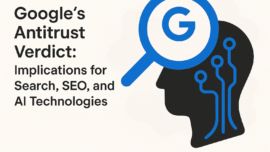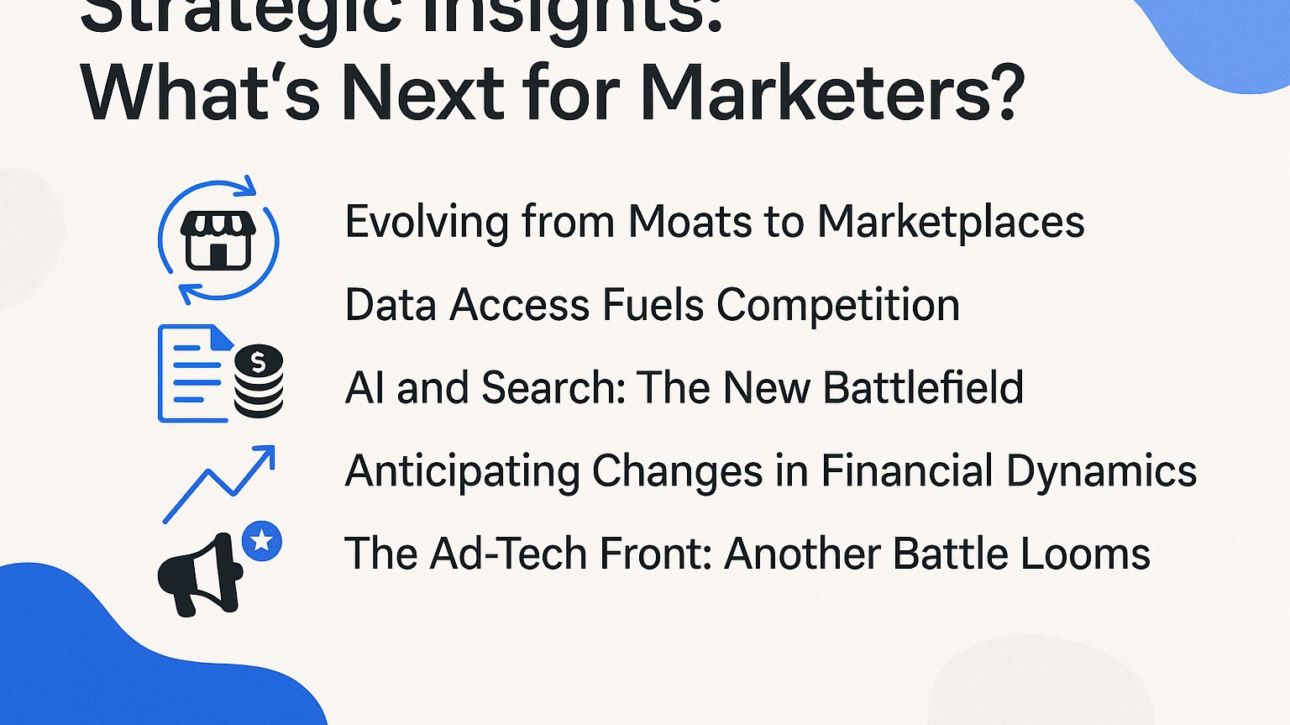The recent antitrust ruling against Google marks a pivotal moment in the tech industry, paving the way for competition in search engines and AI technologies while challenging established SEO norms.
Contents
Short Summary:
- Google is mandated to share parts of its search data with select competitors.
- The ruling refrains from breaking up Google but alters its contract practices.
- Marketers must adapt SEO strategies to the evolving landscape driven by AI and shifting user habits.
On September 2, 2025, U.S. District Judge Amit P. Mehta delivered a significant ruling in the long-standing antitrust lawsuit against Google, a case that has profound implications not only for the tech giant but also for the entire ecosystem of search engines, SEO practices, and AI technologies. This decision follows a lawsuit initiated in 2020 by the Department of Justice (DOJ) and a coalition of states, alleging that Google’s exclusionary contracts and vast payments enabled it to monopolize the search market. While many had anticipated a breakup of Google’s key services, the ruling instead focused on behavioral remedies that reshape how Google operates within the competitive landscape.
Judge Mehta concluded that Google, which commands approximately 90% of the search engine market share, is a monopolist, stating,
“Google is a monopolist, and it has acted as one to maintain its monopoly.”
However, he made it clear that the remedy would not involve breaking up the company’s subsidiaries or imposing user-facing choice screens like those required of Microsoft two decades ago. Instead, the ruling emphasizes data transparency and competition.
Key Decisions from the Ruling
In his verdict, Judge Mehta enforced several crucial changes to Google’s operational practices:
- Exclusive Contract Ban: Google is prohibited from entering into agreements that designate it as the sole default search engine with major tech partners, including Apple and Samsung. This opens the doors for competitors such as Microsoft Bing and newcomers in the AI search field to vie for default status on devices.
- Payments for Placement: While Google can continue its practice of making payments to remain the default option, the court stipulated that it must do so without exclusivity in these agreements. Judge Mehta surmised that completely eliminating payments would harm distribution partners.
- Data Sharing Mandate: Perhaps the most groundbreaking aspect of the ruling is the requirement for Google to share specific portions of its search index as well as certain user interaction data with “qualified competitors.” However, data related to advertisements remains off-limits, maintaining some barriers to entry for new challengers.
- Oversight Duration: A technical committee will oversee the implementation of these remedies for six years, ensuring compliance with the court’s directives. A revised judgment is due on September 10, 2025, with the enforcement of remedies expected roughly 60 days thereafter.
Shift in the Competitive Landscape
The ruling is expected to recalibrate the dynamics of the search market, particularly regarding how companies approach SEO and marketing strategies. Investors reacted positively to the news, with Google’s parent company, Alphabet, shares soaring by about 8% post-announcement. Financial markets expressed relief that no drastic dissolution of Google’s core services would take place, helping assure stakeholders that its business model would remain intact for now.
Strategic Insights: What’s Next for Marketers?
The implications of this ruling extend significantly beyond legal jargon and courtroom battles; they redefine strategic approaches for marketers operating within the digital landscape. Here’s how:
1. Evolving from Moats to Marketplaces
One of the stark changes encompasses how default search positions are determined. Under prior agreements, Google enjoyed a protective moat, ensuring its supremacy across devices and browsers. This decision reorients the search marketplace into a competitive arena. For instance, Google reportedly paid Apple roughly $20 billion in 2022 to maintain its position as the default search engine on Safari. With exclusivity curtailed, Apple can now entertain offers from other providers, potentially increasing its revenue from search partnerships.
2. Data Access Fuels Competition
As Google prepares to share portions of its search index with “qualified competitors,” a new wave of challengers may emerge. This includes established engines like Microsoft Bing and potentially innovative AI-powered search tools. However, the nature of ‘qualified competitors’ remains to be precisely defined, which could significantly influence the efficacy of the data-sharing arrangement.
Access to Google’s data might democratize the search landscape, but without full transparency into critical algorithmic processes, competitors must innovate their offerings distinctly. As Vaibhav Sharda, founder of Autoblogging.ai, asserts, “Index access provides challengers with the legs to run but lacks the lungs needed for sustained competition.” Marketers should keenly monitor how rivals adapt and whether new entrants can effectively harness this data.
3. AI and Search: The New Battlefield
The court’s recognition of generative AI as essential to the future of search underscores a burgeoning reality that search engines must now contend with. As noted by Judge Mehta, the emergence of AI has shifted the competitive dynamics radically. Tools such as ChatGPT, Perplexity, and others are transitioning from auxiliary search aids to primary information sources, complicating Google’s position further.
Content creators and marketers are now pressed to develop ‘assistant-ready’ content — materials that AI-driven tools can effectively cite and utilize. If AI assistants take the lead in answering user queries, SEO strategies must pivot towards optimizing for conversational context and succinct, informative answers rather than merely ranking on Google’s Search Engine Results Pages (SERPs).
4. Anticipating Changes in Financial Dynamics
Despite initial relief among investors, the ruling introduces new fiscal pressures for Google. With distribution agreements facing new scrutiny and competitive bidding now possible, Google’s Traffic Acquisition Costs (TAC) could rise sharply. The long-term financial landscape will require Google to reassess its advertising strategies, as new competitors vie for prominence in search defaults.
5. The Ad-Tech Front: Another Battle Looms
Amid this monumental ruling, the DOJ continues pursuing a separate antitrust case targeting Google’s ad-tech stack. If this case leads to structural changes in how Google handles advertising, it could significantly alter the mechanics of online advertising and monetization strategies for publishers and marketers.
What’s Next for SEO and PPC Professionals?
As the digital landscape transforms, SEO and PPC professionals must rethink their approaches:
- Embrace Distribution Volatility: Prepare for a competitive environment where major browsers, like Safari, become increasingly contestable. Explore partnerships with emerging platforms and test various advertising models.
- Optimize for AI: Ensure that businesses craft succinct and citation-worthy content that resonates with LLMs (Large Language Models). Use schema markup and concise formats to enhance the visibility of content through AI assistants.
- Diversify Search Strategies: As new index-sharing initiatives materialize, stay proactive in forming alliances with alternative search engines and partnerships that align with shifting user behaviors.
- Maintain Attribution Standards: As AI assistants emerge as significant traffic mediators, bolster attribution methods using rigorous UTM governance and advanced server-side tracking to glean insights persistently.
- Innovate Content Formats: Experiment with dual-content structures that appeal to both humans and AI platforms, ensuring a balance between depth and digestibility.
Looking Ahead
The future of search is now heavily intertwined with the development of generative AI technologies, and marketers must adapt to this evolving narrative. Consider the broader implications of the ruling on Google’s search supremacy; it is more than just a legal outcome, it’s a flexible framework that challenges established norms.
As Judge Mehta aptly noted, “Courts must craft remedies with a healthy dose of humility.” The balance of power may shift gradually rather than abruptly, but the dialog around competition will provoke a deeper examination of the relationship between AI, search, and consumer choice.
Marketers must be vigilant, leveraging the latest tools—including AI-generated insights and platforms like Autoblogging.ai—to navigate this complex landscape. The real competition for user engagement is far from over, and being proactive in embracing change will be vital for success in this new SEO era.
Do you need SEO Optimized AI Articles?
Autoblogging.ai is built by SEOs, for SEOs!
Get 30 article credits!



